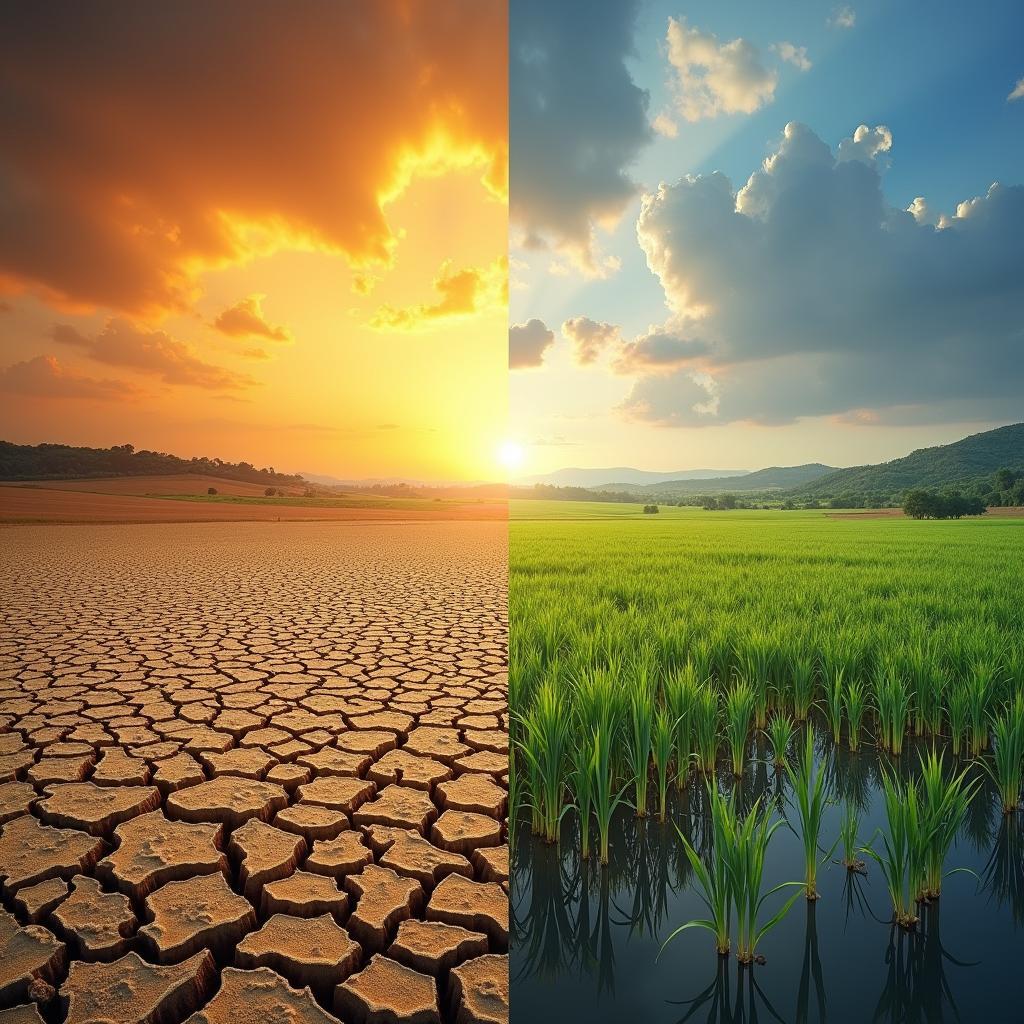Climate change is a global phenomenon with far-reaching impacts on various aspects of our lives, including global food production. With the increasing emphasis on environmental issues, this topic has also become prevalent in the IELTS exam. This article will delve into “How does climate change affect global food production?” through various angles to help you prepare for the IELTS Reading section.
Introduction
The IELTS Reading test requires candidates to read texts on a variety of topics and answer questions that test their comprehension and analytical skills. Topics related to climate change and its impact on global food systems have been featured consistently over the years. Given the importance and relevance of this subject today, it is likely to appear in future IELTS exams as well. In this article, we provide a sample reading passage, followed by questions of varying difficulty and detailed answer explanations.
Sample Reading Passage
Climate Change and Global Food Production
Climate change refers to long-term changes in temperature, precipitation, and other atmospheric conditions on Earth. These changes are primarily driven by human activities, such as the burning of fossil fuels, deforestation, and industrial processes, which release greenhouse gases into the atmosphere. One of the most pressing concerns related to climate change is its impact on global food production.
Over the past few decades, scientists have observed significant shifts in weather patterns, leading to severe droughts, floods, and unpredictable growing seasons. These climatic anomalies can have devastating effects on agricultural productivity. For instance, elevated temperatures can cause heat stress in crops, reducing yields. Simultaneously, excessive rainfall can result in waterlogged soils, which can hinder plant growth and promote the spread of plant diseases.

Moreover, climate change is anticipated to alter the geographic distribution of arable land. Regions that were once fertile may become arid and unsuitable for farming, while new areas may become viable for cultivation. This shift may necessitate changes in crop types and farming practices, leading to economic and social challenges for farmers who must adapt to new conditions.
Additionally, livestock production is vulnerable to climate change. Extreme temperatures can directly affect animal health, leading to increased mortality rates, reduced reproductive performance, and lower milk and meat yields. Indirectly, changes in feed availability and quality can also impinge on livestock productivity.
Despite these challenges, there are potential strategies to mitigate the adverse effects of climate change on food production. Implementing sustainable agricultural practices, such as crop rotation, water conservation, and the development of drought-resistant crop varieties, can enhance resilience. Reducing carbon emissions and adopting more efficient farming techniques can also contribute to long-term food security.
The global community must work collectively to address climate change and safeguard food production systems, ensuring a stable and secure food supply for future generations.
Questions
Multiple Choice (Choose the best answer)
-
What is the primary cause of climate change according to the passage?
- a) Natural weather patterns
- b) Industrial activities
- c) Deforestation
- d) Overpopulation
-
Which of the following is NOT mentioned as an impact of climate change on agriculture?
- a) Increased crop diseases
- b) Heat stress in crops
- c) Fertile regions becoming arid
- d) Decreased use of fertilizers
True/False/Not Given
-
Climate change can lead to both floods and droughts, affecting agricultural productivity.
- True
- False
- Not Given
-
Regions that are currently unsuitable for farming will never become viable due to climate change.
- True
- False
- Not Given
Matching Information
Match the following effects with the causes as described in the passage:
-
Heat stress in crops
- a) Excessive rainfall
- b) Elevated temperatures
- c) Changes in feed quality
-
Increased livestock mortality
- a) Deforestation
- b) Weather anomalies
- c) Extreme temperatures
Sentence Completion
- Sustainable agricultural practices such as ____ and ____ can help mitigate the effects of climate change on food production.
Answer Keys
- b) Industrial activities
- d) Decreased use of fertilizers
- True
- False
- b) Elevated temperatures
- c) Extreme temperatures
- crop rotation, water conservation
Common Errors
One common mistake candidates make is not paying attention to details in the text, which can lead to incorrect answers in True/False/Not Given questions. It is essential to practice skimming and scanning techniques to locate precise information quickly.
Vocabulary
Key Vocabulary from the Passage
- Anomalies (noun): Deviations from what is normal or expected. [əˈnɒməliz]
- Arable (adj): Suitable for growing crops. [ˈærəbl]
- Mitigate (verb): Make less severe, serious, or painful. [ˈmɪtɪɡeɪt]
- Resilience (noun): The capacity to recover quickly from difficulties. [rɪˈzɪlɪəns]
Additional Vocabulary
- Precipitation (noun): Any form of water that falls from clouds and reaches the ground. [prɪˌsɪpɪˈteɪʃn]
Grammar Focus
Conditional Sentences
The passage uses conditional sentences to discuss potential impacts and strategies related to climate change.
- First Conditional: “If farmers adopt sustainable practices, they can mitigate the adverse effects of climate change.”
- Structure: If + present simple, … will + base verb.
Tips for High IELTS Reading Scores
- Practice Regularly: Consistent practice with varied reading materials will help improve your reading speed and comprehension skills.
- Use Context Clues: For unfamiliar words, use the surrounding text to infer their meanings.
- Time Management: Allocate a specific amount of time to each passage and stick to it to ensure you have enough time to answer all questions.
- Review Wrong Answers: Analyzing why you got a question wrong will help you avoid making similar mistakes in the future.
By understanding the implications of climate change on global food production, you not only prepare yourself for potential IELTS Reading questions but also gain valuable insights into one of the most pressing issues of our time. Good luck with your IELTS preparation!